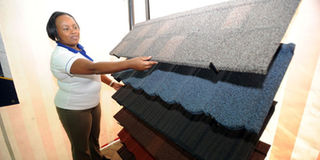It’s a dream come true for tile marketer

PHOTO | SULEIMAN MBATIAH Space and Style Ltd CEO, Winnie Ngumi displaying various roofing materials by Decra Roofing Systems.
What you need to know:
- After an eye-opening tour of South Africa, woman architect seizes the moment to provide the Kenyan real estate market with specialised building materials
Winnie Ngumi’s love for architecture has always pushed her to work towards transforming the male-dominated industry. The chief executive of Space and Style, a company that supplies specialised building materials and best known for its roofing brand, Decra, says that she works towards innovative, technologically-sound, and affordable products.
Since 2002, Nairobi-based Space and Style claims to have been the market leader in the construction materials’ market. From a company of two partners, Space and Style has grown to have 45 permanent employees, four major suppliers outside Nairobi, and hundreds of certified constructors familiar with installation of Decra products spread all over Kenya.
Although Ngumi is modest about her company’s worth, the evidence of her work gives an indication of how sought-after her products are. She has roofed five star Enashipai Hotel in Naivasha and institutions like Brookhouse.
“We have even supplied the High Court with Decra and Decra-related products. All I know is that in 2002, there were less than 10 pieces of Decra in the country, now there are hundreds of thousands or more,” she says.
The birth of her firm, she says, was a coincidence. She had gone to South Africa as a freelance architect in 2002 and seen a technology similar to Decra.
On coming back to Kenya, an organisation was scouting for a credible company to supply a “unique roofing product”. She saw that as another “divine catalyst” to get into the business.
“That is when I had my ‘eureka’ moment to start the company... it had to be then or never,” she told Money.
She partnered with a like-minded entrepreneur where she became the technical person as her partner handled the logistics. Together, they went as far as New Zealand to get a reputable manufacturer for their products. Decra is made from volcanic stones in New Zealand and comes with natural colours.
The start was, however, not simple: “It was a new concept, and definitely that was met with a lot of it’s-a-rich-man’s-product attitude”.
She had to travel to houses, organisations, and sponsors marketing the products. Gradually, the uniqueness of the product won the eye of many constructors: It is light, yet has a steely strength, it can achieve the clay look and available in many natural colours, and the installation requires special nails and rust-free metals and nails which not only cut down the use of timber, but make construction faster and less tedious.
“Many were surprised that the colours were not from painting or some dye,” she says.
Hard work and resilience, two attributes which she says she is not afraid of, have not only given her clout and respect, but also steeled her nerves to handle the challenges of being a woman in a male-dominated industry.
“It is usually a surprise to many when I am the one inspecting how work is progressing in the field. We should train female constructors to climb the roof because I am yet to come across one,” she adds.
Training staff
Her company has achieved success due to consistent partnerships, she says. She invests heavily in training her staff as well as the traders who handle her products.
“A good product is nothing without the right skills to use and market it, and we remedy that by training even if it means importing an expert.”
She is in collaboration with the National Construction Authority (NCA) to train and award NCA-accredited certificates in compliance with the new construction laws that will be enforced in July this year.
Through her programme Fundi Maalum, Kiswahili for special fundi, she has trained hundreds of low income constructors on the legal rules guiding construction and business skills.




